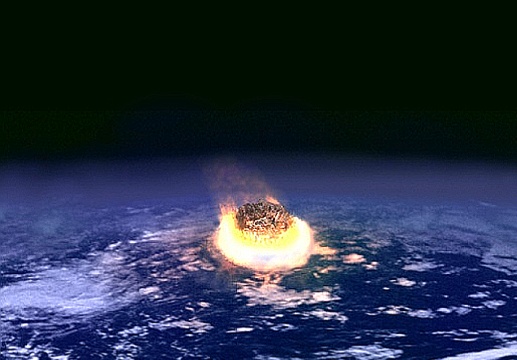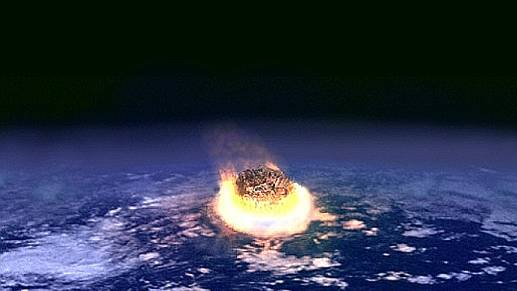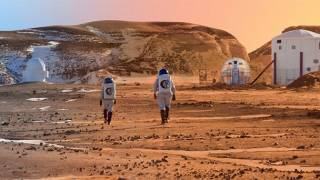Astronauts want plan ready for asteroid hits
Source: metronews.ca

Canadian and American astronauts say the world should already be preparing for the big one — the asteroid that could some day strike the Earth causing death and destruction.
"You’re just sticking your head in the sand if you think the world will live out its entire natural life until the end of our sun and never be hit by another big rock," Canada’s Chris Hadfield said in an interview.
"That’s just foolishness. That’s just ignorance."
The Canadian Space Agency astronaut is the current president of the Association of Space Explorers (ASE), which submitted a report to the United Nations outlining a detailed plan to deal with any asteroid threat.
"We’re rolling the dice that the big one is not coming right away," Hadfield warned.
Hadfield, 51, will get a chance to observe asteroids first-hand during his upcoming six-month mission to the International Space Station.
He is due to blast off on his third space trip in late 2012 and will also take charge of the lab for several months, becoming its first Canadian commander.
During his first space flight — a visit to the Russian space station Mir in 1995 — Hadfield watched a big rock come bearing down on Earth.
It eventually burned up in the atmosphere, but the 18-year space veteran admits the experience sent a shiver up his spine.
"If it had been a little higher, it would have come right through us (the space station)," Hadfield said.
Former U.S. astronaut Russell (Rusty) Schweickart chaired the ASE international group which issued its 54-page report on the asteroid threat in 2008.
The report focuses on detection and deflection and calls for a unified global response.
Schweickart told The Canadian Press new telescopes will dramatically increase the rate at which asteroids are discovered within the next 10 to 15 years.
"You’re going to multiply the 7,000 objects that we have in our catalogue now up to one million objects as we get new telescopes operating," he said in an interview from Sonoma, Calif.
The Space Explorers Association has been working closely with the United Nations and the world body is now holding a series of workshops on ways to prepare for threats from so-called Near Earth Objects (NEOs).
The work will culminate in a recommendation to the United Nations General Assembly next year or in 2012.
"There is no one in the United States or anywhere in the world who has the specific responsibility of acting and developing the technology . . to deflect an asteroid when we find one that does threaten us," Schweickart added.
The retired Apollo astronaut stresses that any effort to deflect a potentially dangerous asteroid would have to begin 10 to 18 years before the impact is predicted.
But he adds the basic technology to deflect a threatening asteroid currently exists.
One method involves smashing a spacecraft into the object to change its velocity enough to miss Earth.
Schweickart’s comments come as Canada gets ready to assume a key role in the search for any menacing NEOs.
In March 2011, the Canadian Space Agency hopes to launch NEOSSat, which will be the first space telescope "totally dedicated to keep an eye out for the rest of the world."
NEOSSat (Near Earth Object Surveillance Satellite) will scan areas near the sun to pinpoint asteroids which have not yet been detected.
The $15 million suitcase-sized-satellite, which will circle about 700 kilometres above the Earth, will look for potentially hazardous asteroids.
"What we’re looking for is advance warning," senior project manager Bill Harvey said.
"Of course those (asteroids) are the larger ones. . .anything over 50 metres that has a potential for an impact."
A 45-metre-wide space boulder exploded over a wooded area in Siberia in 1908 in what became known as the Tunguska event.
About 2,000 square kilometres of trees were flattened in an uninhabited area.
The Manicouagan crater in Quebec, which is 65 kilometres in diameter, was caused by an asteroid that slammed into the Earth some 200 million years ago.
Harvey says he expects NEOSSat to detect several hundred new asteroids during its first year of operation and "probably up to a thousand."
NEOSSat will conduct scientific studies of asteroids and also monitor the beehive of satellites currently orbiting the Earth to make sure they don’t slam into each other.
Harvey says astronomers are currently keeping an eye on an asteroid named Apophis after observations in 2004 indicated there was a 2.7 per cent chance it would strike Earth in 2029.
Additional observations eliminated the possibility of an impact that year, but Harvey remains cautious because another close encounter with Apophis is expected in 2036.
"(If) its orbit gets altered by some event— and that event could be coming in proximity with another body like Venus or Mars — that could change the trajectory," he said.
Schweickart points out that nearly 300 asteroids have some possibility of impacting the Earth in the next 100 years.
Scientists recently warned that "1999-RQ36," an asteroid that is more than 500 metres wide, has a one-in-1,000 chance of striking the planet in 2182.
Meantime, U.S. President Barack Obama has asked NASA to develop plans to visit an asteroid and the space agency is already looking at a potential human mission to visit one known as "1999-AO10" by 2025.
It’s estimated such a mission would take about six months with the astronauts spending about two weeks "riding the asteroid" as it blazes past the Earth.
Earlier this year, the Obama administration decided on a flexible path for space exploration which favoured a visit to an asteroid instead of a return to the moon.
Article from: metronews.ca






















